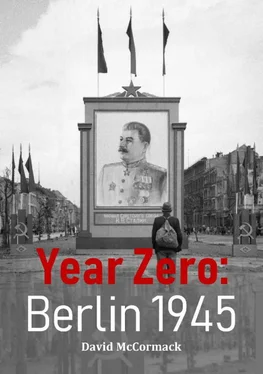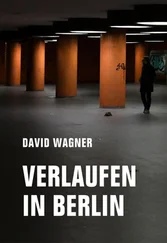Hitler received Goering’s telegram calmly, however, Bormann succeeded in changing his perception of Goering’s motives by presenting the message as a mutinous ultimatum and lustful grab for power. Within moments, Hitler was denouncing Goering as a lazy, corrupt failure. A radio message, written by Bormann stripped Goering of all his offices. No doubt he would have preferred him executed, but Hitler thought that he might still have some role to play stating, ‘Well, all right, let Goering negotiate the surrender. If the war is lost anyhow, it doesn’t matter who does it’. Bormann did however manage to ensure that Goering was kept under house arrest, thus effectively eliminating his rival for the succession.
The day following Hitler’s collapse was marked by the emergence of the General destined by a trick of fate to defend Berlin. During the night, Weidling had been forced to relocate his headquarters to Rudow, a borough located between Neukolln and Schonfeld. His unit was now well within the city limits and in close contact with Soviet forces. It therefore came as some relief when he received orders from General Busse to break through the Soviet forces and link up with the northern flank of 9 thArmy near Konigs Wusterhausen. As his troops were preparing to disengage from the enemy on the morning of 23 April, Weidling was at last able to re-establish contact with Berlin. His telephone call to the bunker was passed on to General Krebs. Guderian’s successor greeted him with barely concealed contempt, informing Weidling coldly that he had been sentenced to death for pulling his troops back to the Olympic Village at Doberitz, located to the west of the city. To Weidling, this was utter nonsense, as his troops were attempting to disengage from the Soviet forces on the eastern sector of the city. He then made, what was in the circumstances, a brave decision to put his case personally to Hitler.
Weidling arrived at the bunker in the early evening to be met by General Krebs and General Burgdorf who received him coolly. Unfazed, Weidling launched into a spirited defence, stating that the only troops that he had sent to the west were a small number of foreign ‘volunteers’ attached to labour battalions and some sick and wounded. Asked for the present whereabouts and situation of his Corps, Weidling replied that his troops were currently in the process of disengaging from the enemy in order to move south as ordered. Krebs assured Weidling that it had all been a misunderstanding. Before seeing Hitler, the orders for his Corps to move south were cancelled and he was given fresh instructions to concentrate on the defence of the city.
The subsequent meeting with Hitler resembled a one act farce, as the death sentence was rescinded and replaced by an appointment as commandant of the Berlin defence area (replacing Colonel Ernst Kaether who had been in post for less than a day). Weidling later recalled his meeting with Hitler:
Behind a table covered with maps sat the Fuhrer of the German Reich. He turned his head as I entered. I saw a bloated face and delirious eyes. When he tried to stand up, I noticed to my horror that his hands and one of his legs were trembling. He managed to stand up with great difficulty. He offered me his hand. With a distorted smile and in a barely audible voice he asked whether we had met before. When I replied that he had decorated me with the oak leaves to my Knight’s Cross on 13 April 1944, he said: ‘I recall the name, but I can’t remember the face’. His own was like a grinning mask. He then laboriously got back into his armchair. Even while he was sitting down, his left leg kept twitching. His knee moved like the pendulum of a clock, only faster.
After having made Weidling responsible for the defence of Berlin, Hitler issued instructions for his Corps to deploy in the southern and eastern sectors of the city. He then went on to expound his own ideas for the defence of the city which involved pulling in the forces of Wenck, Busse and Steiner. That day, Weidling started to disengage his forces. The reduced 56 thPanzer Corps consisting of remnants of the 9 thParachute Division, the badly mauled Muncheberg Panzer Division, the 20 thPanzer Grenadier Division, the 11 thPanzer Grenadier Division ‘Nordland’ and the 18 thPanzer Grenadier Division. His units were used to stiffen the defence sectors held by a miscellany of trained troops and poorly equipped home guard units.
On the morning of 24 April, 20 thPanzer Grenadier Division were engaged in hard fighting along the Teltow Canal, successfully eliminating a Soviet bridgehead at Lankwitz. However, they were too thinly spread to prevent the establishment of a small lodgement at Stahnsdorf. Watching the unfolding drama from a rooftop observation post, Marshal Konev surveyed the scene:
From the roof of this building we had a fine view of Berlin, especially its southern and south-western districts. The left flank could be seen as far as Potsdam. Our field of vision extended to the right flank where, on the outskirts of Berlin, the troops of the 1 stUkrainian and the 1 stBelorussian fronts were to link up.
I remember how vast the city appeared to me. I noted the massive old buildings, in which the district that lay before me abounded, and the density of these buildings; I took note of everything that might complicate our task of capturing Berlin. I also noticed the canals, rivers and streams that crossed Berlin in different directions and were plainly visible from above. Such a multiplicity of water obstacles promised additional difficulties.
Before us lay a front-line city, besieged and prepared for defence. Had there been a reasonable government at the head of Germany it would have been logical, under the circumstances, to expect from it an immediate surrender. Only surrender could have preserved what still remained of Berlin; it would also have saved the lives of many of its citizens. But it was apparently futile to expect a reasonable decision and we had to fight it out. As I gazed upon Berlin I reflected that its end would spell the end of the war and that the sooner we took the city the sooner the war would be over.
Konev’s hopes came a step closer following the main breakthrough which came in the centre of the line at Teltow itself. By late morning 6 thGuards Tank Corps crossed the canal establishing a firm bridgehead which was soon strengthened by the addition of a tank bearing bridge. Later, General David Abramovitch Dragunski described the assault on the German defences:
The attack began. The approaching dusk was submerged by the artillery preparation’s sea of fire. A mighty shock wave pressed us into the earth… I had not seen firing of such intensity for a long time. The breakthrough near Kiev, the battle of Lvov, the attack on the Sandomierz bridgehead, all these vast operations could not be compared with what occurred on the Teltow Canal in the morning hours of 24 April… A whole artillery corps concentrated within two days on a narrow breakthrough sector, effecting a density of 600 gun barrels per kilometre of front, massing together mortars, organising the fire plan, measuring out the firing positions while on the move and finally coordinating everything that could be achieved by a talented army commander like Marshal Konev… Then thousands of shells roared over the heads of our tank troops. Behind us rumbled the dull thumps of the mortars. The fire trails of the Katiushas ripped apart the sky. General Riasanov’s bombers and fighters attacked, while Pokryschkin’s fighters covered them from above.
The north bank of the canal and the southern boundary of Berlin were in flames. Buildings and fortified positions fell in rubble and ashes as thick clouds of smoke rose up… Thousands of enemy soldiers were killed… Futilely, Goebbels cried out that the Russians would never get into the city. In vain, many of his believing audience put their hopes in the so-called wonder weapons… Right until the last minute they hoped for some miracle or other, but the miracle kept them waiting…
Читать дальше












